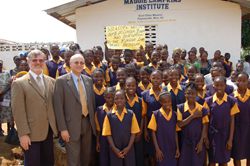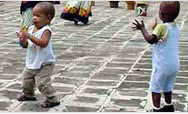Africa Education Initiative: Ambassador's Girls' Scholarship Program Replaces Child Labor with Homework in Liberia

December 21, 2007.
Montserrado County, Liberia
Beatrice Roberts has an intense gaze for a 6th grader and stands erect at the podium of a small church next to her school in the Soul Clinic community of Paynesville, a rural suburb of Liberia's capital, Monrovia. She speaks words of thanks for the Ambassador's Girls' Scholarship Program, part of President Bush's $600 million, nine-year Africa Education Initiative (AEI) run by USAID.
In front of the packed congregation U.S. Ambassador Donald Booth and Acting USAID Mission Director Rick Scott presented 37 girls with scholarships, backpacks stuffed with school supplies, and an enthusiastic handshake, a moment captured in a snapshot that each girl will also receive. Also looking on as Beatrice speaks are the principal of her school-the Maggie Lampkins Institute-Soul Clinic community leaders, the managers of the scholarship program, the media, classmates, the other scholarship recipients and their families, and perhaps most important of all for Beatrice, her grandmother.
When you meet Phebe Joe Roberts you understand where her granddaughter gets the intense gaze and stoic pose. She is raising eight grandchildren as their parents-her children-were all lost to the 14-year war that ended a few years ago. The education system and the entire country is rebuilding from ruin, as is her family. She breaks rocks to make a living. Beatrice used to help out by selling charcoal. The case of the Roberts family is typical of others in the audience, there to see their girls receive scholarships on this day.
In Liberia, in 2008 1,070 girls, like Beatrice at risk of dropping out of school, receive scholarships to cover school fees, textbooks, copybooks, backpacks, uniforms, shoes, pencils, and pens. Also at the awards ceremony, Ambassador Booth announced that, partly due to overwhelming demand from communities and local government, for the first time 619 boys will be eligible to receive scholarships this year.
Students in 19 schools, largely public, participate in the program. For girls who have more than an hour's walk to school, the scholarships provide bicycles. Boston-based World Education manages the program for USAID's Africa Bureau with local partners Children Assistance Program Inc. in Montserrado County and Development Education Network-Liberia in Bong County.
Since the program began in the 2004-2005 school year, a total of 2,642 scholarships have been awarded to primary school girls in these two counties. The scholarships are awarded competitively by a board consisting of representatives from the Ministries of Education and Gender and Development, USAID, UNICEF, NGO partners, community leaders, teachers, and health workers. Students from very poor households or those who are disabled, orphaned, or affected by HIV/AIDS are invited to go through the application, interview, and screening process.
If they are selected, the children no longer have to worry about going to and staying in school. As Beatrice tells an inquiring visitor after the ceremony, "I don't have to get up in the dark and sell coal anymore." Her classmate and co-awardee, Jasmine Yarziah, eagerly chimes in. "I'm so glad I don't have to pick and sell potato greens anymore to get the school fees. I had to walk all that way before going to school." Asked what she liked best about the program Beatrice shyly grins for the first time and says, "The uniform." For her it is not only a source of school pride, but also personal dignity, "I don't get kicked out of school anymore for not paying the fee or not having the supplies." While they appear to be 11 and 12, Beatrice is 15 and Jasmine is 16, and making up for the lost years of education.
Poster board signs prepared by the students with guidance from the teachers surround the speakers at the event: "Thanks to the U.S. government through USAID. God bless you"; "Long live Ambassador Booth and delegation"; "Education is better than silver or gold." A more spontaneous expression of the children's excitement at the visitors and the awards erupts after a group photo outside their school, too small to accommodate the day's crowd, as they sing multiple rounds of "We Wish You a Merry Christmas!" to the American delegation. It is the Friday before Christmas and the New Year looks promising to the girls, their families, and the community of Soul Clinic, Liberia.
Margaret Sancho-Morris is USAID Education Team Leader for Liberia and Gib Brown is Basic Education Advisor.
Back to Top ^
|


